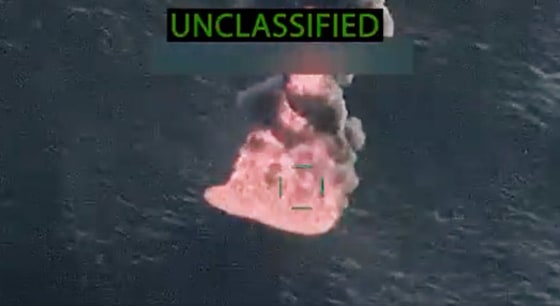The U.S. military carried out three strikes Monday on four vessels in the eastern Pacific Ocean that were allegedly trafficking narcotics, Defense Secretary Pete Hegseth said Tuesday.
Hegseth said in a statement on X that the strikes killed 14 “narco-terrorists” and that there was one survivor. Mexican authorities took over responsibility for rescuing the survivor.
Hegseth said that the boats were "operated by Designated Terrorist Organizations (DTO) trafficking narcotics in the Eastern Pacific" and that they were known to "our intelligence apparatus."
He included a video in his post marked "unclassified" showing boats in the water being hit by the strikes and suddenly on fire.
No additional details about the vessels or the alleged narcotics they were carrying were provided. Hegseth also didn't share where the boats originated from.
Mexican officials didn’t confirm whether the lone survivor is in Mexican custody. Mexican President Claudia Sheinbaum expressed disapproval of the strikes when she was asked about them at a news conference Tuesday.
“We want all international treaties to be respected," Sheinbaum said. "We do not agree with these kinds of attacks, so I have requested that, within the framework of the security agreement we have with the United States, the ambassador be called in and that this situation be reviewed."
Based on official estimates from the Defense Department, the U.S. military has launched 13 strikes so far, three of them Monday, which in total have killed 57 people. Eight strikes occurred in the Caribbean Sea, and five took place in the eastern Pacific.
The most recent strike before Monday happened Friday in the Caribbean. Later that day, Pentagon spokesman Sean Parnell said Hegseth directed the aircraft carrier USS Gerald R. Ford strike group, which had been stationed in the Mediterranean, to relocate to the Caribbean to support President Donald Trump’s effort to dismantle transnational criminal organizations and counter narcoterrorism.
The attacks are an escalation of Trump's threats to crack down on drug smugglers, even amid bipartisan pushback. Six sources told NBC News this month that members of Congress from both parties have expressed concern that the administration isn't being transparent enough about the strikes.
Sen. Ruben Gallego, D-Ariz., a Marine Corps veteran, said Sunday in an interview on NBC's "Meet the Press" that the strikes amounted to "murder."
“If this president feels that they’re doing something illegally, then he should be using the Coast Guard," Gallego said. "If there’s an act of war, then you use our military, and then you come and talk to us first. But this is murder.”
Sen. Rand Paul, R-Ky., accused the administration Sunday of violating the Constitution by pursuing military action without congressional approval.
"I’ve been invited to no briefing, but a briefing is not enough to overcome the Constitution," he said on "Fox News Sunday." "The Constitution says that when you go to war, Congress has to vote on it."
After another set of strikes last week, Trump said that his administration had the legal authority to carry them out and that the operations could eventually expand to targeting drug traffickers on land.
“We will hit them very hard when they come in by land,” Trump told reporters at the White House. “We’re totally prepared to do that. And we’ll probably go back to Congress and explain exactly what we’re doing when we come to the land.”
NBC News reported in late September that U.S. military officials were preparing options to target traffickers inside Venezuela. Four sources said at the time that those strikes could take place in a matter of weeks.

